COLUMBUS, Ohio — For someone who’s spent much of his life squatting behind a static plate, Henry Davis can’t stay in one spot for too long. He's in perpetual motion, an athlete guided by the bedrock belief that you’re either getting better or getting worse.
The only time the kid presses pause is to freeze-frame video to analyze his swing.
So while some used the global pandemic as an excuse to sleep a bit later and binge on bad food and Netflix, the University of Louisville's standout catcher was busy inventing ways to improve his game and stay motivated. Two years ago, Davis put a whiteboard in the foyer of his campus apartment that he shared with five teammates. He encouraged them to write their goals on it, and atop his list he scribbled “1-1,” shorthand that signifies the first overall pick in the Major League Baseball Draft.
The coronavirus had prematurely ended a promising start to a 2020 season for the Cardinals, a national title contender, and for Davis, a sophomore who was hitting .372 with three home runs and 13 RBIs in 14 games.
“COVID took a lot from a lot of baseball players, and we felt that,” Louisville coach Dan McDonnell said. “In our program, Year 2 to Year 3 is such a developmental year, and a lot of kids lost it. What was impressive to me is ... somehow Henry got better.”
In selecting this 6-foot-2, 210-pound catcher with the top overall pick Sunday night, the Pirates’ general manager, Ben Cherington, lauded the prospect’s strong arm, hitting ability and work ethic. His best attribute, however, might be his resourcefulness. He searches relentlessly to find ways to address problems. It’s been apparent since he began playing on the sandlots of Bedford, N.Y., and it served him well in the pivotal months after the virus sidelined much of the sports world.
With the help of his father, Chris, and his younger brother, Morgan, he built a mound in the family’s sprawling back yard after ordering the materials online. It allowed Morgan, a promising pitcher, and his older brother to polish their respective crafts. Davis also reached out to Adam Ottavino through social media after noticing the Red Sox reliever was posting photos of himself throwing into a net. Davis lives nearby, and he offered to assist.
“Henry was like, ‘I’m happy to come and catch you and stand 60 (feet) away and Purell all the balls,” recalled his mother, Andi Schaefer.
Davis became baseball’s version of Door Dash for the major-league pitchers of Westchester County. Ottavino’s teammate, Matt Barnes, also took advantage of the enterprising college student and honored his services by thanking him on Instagram:
None of the invaluable training was enough to sate Davis’ appetite, however. He wanted to play games again. He wanted to hit live pitching.
Davis found a startup college summer league — among the few that did not cancel its season — mostly populated with Big Ten talent and playing in suburban Indianapolis. Returning to Louisville, he and several fellow Cardinals drove two hours each way several times a week.
Back on campus for his junior season, Davis earned all-American honors, hitting .370 with a 1.145 OPS, 15 home runs and 48 RBIs.
“Henry looked like he hadn’t skipped a beat,” McDonnell said.
____________________
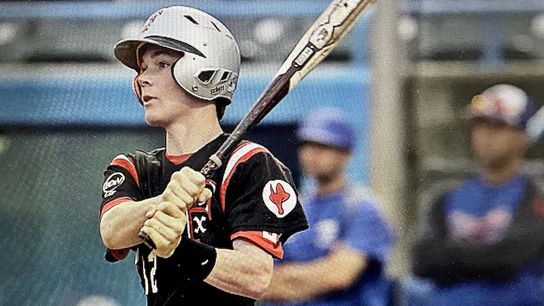
ANDI SCHAEFER
Henry Davis, note the lack of batting gloves, playing for his high school baseball team.
Davis grew up in a small town about 45 miles north of New York City, an idyllic hamlet that provides many youngsters with a financial safety net as large as the one running from the PNC Park foul poles to home plate. Bedford is known for its cozy downtown, its boutiques, and its horse-riding trails.
Hollywood stars Bruce Willis, Glenn Close and Blake Lively own homes there. So do Martha Stewart, Ralph Lauren and billionaire investor George Soros. Seven Springs, the estate purchased by Donald Trump in 1995, also is part of the gilt-edged town fabric.
Such affluence can spur inspiration or allow it to fade from sight like the shoreline aboard a family sloop.
“When you come from means shall we say, and Henry does, it’s super easy to kick back and say, ‘Life is going to be wonderful for me,’” said Matt Hillis, who coached Davis in baseball at Fox Lane High School in Bedford. “Not only did that not happen, but Henry went the exact opposite direction.”
Davis, 21 and his siblings, Morgan, 17, and Olivia, 24, are all driven to succeed. Resourcefulness is a family trait. Olivia completed her undergraduate and master’s degrees at the University of Virginia in four years before becoming a senior analyst for American Express. Davis graduated from Louisville in three years with a degree in sport administration.
The kids didn’t need to look outside the family home for motivation. Chris sold software and built technology-based companies before retiring. Andi was an investment banker on Wall Street, and now develops homes and does historic renovations in Florida. (The couple divorced when Davis was in high school.)
The entire family was together in Denver for the draft this week. On the day after her son was selected No. 1 overall, Andi was on a work-related teleconference before attending the Home Run Derby.
“I came from a (wealthy) family like this,” Andi said. “My parents never gave me a thing. I worked at Nathan’s and Friendly’s. I got to go on beautiful trips, but I worked day and night.”
It might not appear on her LinkedIn page, but Andi considers her primary job to be a “baseball Sherpa.” She and her former husband spent countless hours driving the boys to tournaments and showcases. Wednesday night, Andi sat in the Atlanta airport talking to a reporter by phone while surrounded by mitts and backpacks filled with baseball gear.
“I’m the parent who says, unless my kid is at the front door begging me to take them to play a sport, I’m not doing it,” Andi said. “But if they do, then I will do everything I can to help them.”
____________________
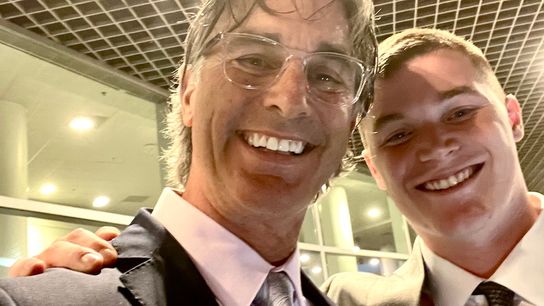
MATT HILLIS
Fox Lane High School baseball coach Matt Hillis and Henry Davis.
Depending on what end you burn life’s candles, 4 a.m. is either really early or really late. Sam Byrns might have experienced neither had he not been one of Davis’ close friends and high school teammates.
It wasn’t enough to attend practices and hit balls off a tee at his house. Davis thought quality work could be done from 5 a.m., until the first bell rang at Fox Lane High. That’s how he convinced Byrns and others to sacrifice sleep in order to drive 20 minutes to the Athlete’s Warehouse, a training facility owned by one of the coaches.
“Henry doesn’t have an off switch,” said Byrns, who’s working in the field of strength-and-conditioning. “Baseball is a 365-day obsession with him and 366 days in a Leap Year.”
Davis tried multiple sports as a child, but he’s played baseball almost exclusively since fourth grade. While some kids run to the dugout screaming when coaches ask them to audition at catcher, Davis embraced the role. He loves the physical nature of the position. He never wanted to play anywhere else.
Though mentors praise his analytical mind, there’s an old-school quality about his approach to the game. He’s rarely worn batting gloves, preferring the rugged feel of a bat in his hands. According to a Fox Sports story in May, there were just 11 major leaguers who were hitting sans gloves this season.
“The times he wore them, he would rip through them just because of how he swings is pretty violent,” said Morgan, a 6-foot-5, 220-pound pitcher. “If you shake his hand, it’s like sandpaper. You’ve seen callouses on a hand, right? His hands are pretty much all callouses.”
When Davis wasn’t playing the game in Bedford, he was researching it. He scoured the internet for ways to sharpen his skills.
Davis developed his rocket-launching right arm by going to the high school football field and attempting to throw baseballs 100 yards on the fly. From what he read, if a catcher could cover that distance, it meant he could throw balls 90 miles per hour. Often times, poor Morgan was tasked with retrieving them.
“We would go to soccer fields and the goals were like 100 yards apart,” Morgan said. “Henry would sit in a squat, jump up like he was throwing down to second (base) and hit us on a line.”
Davis dragged Byrns and Morgan to the high school diamond in the dead of winter for practice time. When conditions grew inhospitable, he set up a pitching machine in a snow bank and caught balls in the family garage.
His parents mounted netting and bought him tees. His high school coach recalls getting clips of Davis taking swings that were sent to his phone at 11 p.m.
There are plenty of cautionary tales about athletes who specialize in one sport. Louisville recruiting coordinator and hitting coach Eric Snider prefers players who compete in multiple sports. This week, the Pirates drafted a pitcher (Bubba Chandler) who was recruited to play quarterback at Clemson and an outfielder (Lonnie White) who’s been offered a scholarship to play receiver at Penn State.
The biggest concerns with specialized athletes is they either burn out or they fail to reach their goals and don’t have a fallback sport.
“You see it all the time,” Hillis said. “We’ve had kids who have said, it got to be ‘too much.’ But those two words never entered into Henry’s vocabulary. His enthusiasm for the game comes out of his pores. It was there at the beginning, and it’s never waned.”
____________________
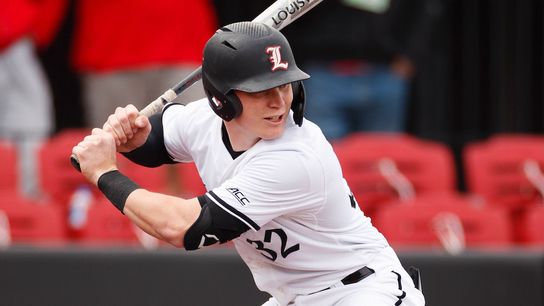
LOUISVILLE ATHLETICS
Henry Davis earned All-American honors last season at the University of Louisville.
Snider’s first memory of Davis is a ball caroming off the backstop seven years ago at Terry Park in Fort Myers, Fla. It was a showcase for middle-school players, hundreds of kids trying to make good first impressions on scouts.
The runner at first base believed he had a free pass to second. Davis, a rising freshman at Fox Lane, had no intention of granting it. The catcher fetched the errant ball, wheeled toward second and delivered a strike.
“The runner wasn’t particularly fast, but I’m telling you that throw was as straight as an arrow,” Snider recalled.
Within a year, the Louisville recruiting coordinator offered Davis a scholarship. The youngster and McDonnell, who hails from the same area of New York, formed a bond and Davis committed to the Cardinals.
Louisville has made two College World Series appearances in Snider’s seven seasons at the school. In that span, eight players have been drafted in the first round, including catcher Will Smith, who won a title with the Dodgers last season.
Snider sees the natural talent in Davis, which helped make him the program’s first-ever No. 1 overall pick. But it’s a leave-no-stones-unturned mindset that most impresses the assistant coach.
“He’s such an analytical dude,” Snider said. “He can break down videotape and communicate what he sees to teammates. He can look at pitchers that he’s going to see that night, and he has a very good idea what he’s going to face. He takes advantage of every resource. I’ve never dealt with anyone like this in my 30 years of coaching.”
Snider acknowledges Davis’ need to improve his blocking and receiving in the catcher’s box. It’s a lack of consistency, not ability that creates the occasional defensive lapse. Every prospect matures at his own pace and progress is rarely linear. Snider believes Davis will fix the problems during his minor-league apprenticeship, which figures to last a few years.
“He drops some balls now and again, but he has a mental toughness about him,” Snider said. “He will just keep getting better.”
As a freshman, Davis made the final out in a College World Series semifinal loss to eventual tournament champion Vanderbilt. The catcher kept a video of the fateful at-bat on his phone, using it as motivation. He worked on his swing. He added muscle to his frame. He changed his diet and committed to wearable technology, which monitors his metabolism and sleep patterns. He retuned for his sophomore year and wore out opposing pitching until the pandemic forced college baseball to roll out the tarp on the season.
“When you have a clear vision, when you set a goal with great clarity, then everything else just falls in place,” McDonnell said. “ . . . He’s been very public about his freshman year and how he knew he could do more and how he was going to live with no regrets when it came to the game of baseball.”
____________________
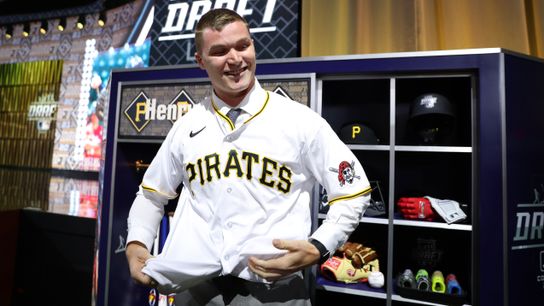
GETTY
Henry Davis dons a Pirates jersey after being selected No. 1 overall Sunday night in Denver.
The Pirates had plenty of options at the top of the draft board. There was Vanderbilt pitcher Jack Leiter and several terrific high-school shortstops, but the hard-hitting, catch-and-throw Davis made the most sense to Cherington.
The top college prospect is likely to sign for below the $8.4 million slot value afforded to a No. 1 overall selection in terms of bonus pool money. It enables the franchise to spread the wealth and help entice other high picks to sign.
The Pirates did their homework on Davis and the catcher’s family did its homework on the Pirates. They know about the club’s dearth of catching prospects in the minors and how that might impact Davis’ trip through the system.
“It’s an opportunity for the team because in my view, they are getting more than their money’s worth,” Andi said. “And, it’s an opportunity for Henry — so it’s a perfect fit.”
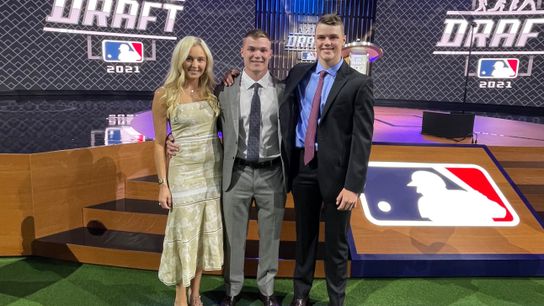
ANDI SCHAEFER
Olivia, Henry and Morgan Davis on stage in Denver after Henry was picked No. 1 overall.
Davis is not Najee Harris. He won’t be in the Pirates’ starting lineup next season. Pro baseball can be cruel. Prospects can plateau in the minors. Great potential can dissolve into middling talent at the major-league level. There are no guarantees, even for No. 1 picks, and some worry all that analytical data floating around in Davis’ head could cause him to press.
The Pirates love his dedication and his zeal and the way he handles pitchers and interacts with teammates. He’s got a track record of grabbing opportunity with those calloused hands and not letting go.
“The time we’ve had around him recently, just how interested he is in finding new challenges and pushing himself to get better,” Cherington said. “He’s really excited about that process.”
Sunday night, Olivia stood on the stage in Denver and had her picture taken with her older brother. She saw that same smile that greeted her at the breakfast table years ago in the family home. Five-year-old Henry, barely able to contain his excitement about the chance to pick up his mitt and play baseball.
“When he was in Indy playing in that summer league, I got a call from his agent who said, ‘I just saw Henry play two games in 95-degree heat,’ ” Andi recalled. “I just laughed. It’s what we always say about him: ‘He will do whatever it takes to keep in shape and keep playing the game.’ ”
Henry Davis is all about baseball 365 days a year. Unless, of course, it’s a Leap Year.

